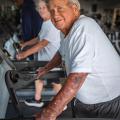Food and Health
Food is a daily need that all Mississippians have in common—we all need to eat, and most of us love to eat! But food choices also have a significant impact on health, from getting a breakfast boost that powers up our brains for a successful day to fighting heart disease. The MSU Extension Service strives to make sound, science-based information available and understandable to help Mississippians of all ages make positive decisions about their health and wellness.
Extension is the home of the Office of Nutrition Education, which administers two federally funded programs—the Expanded Food and Nutrition Education Program (EFNEP) and the Supplemental Nutrition Assistance Program-Education (SNAP-ED).
Extension also offers the ServSafe training for personnel working in our state’s restaurants, school cafeterias, and food businesses. We also provide the TummySafe training for those working in child-care centers.
“Health is a state of complete physical, mental, and social well-being, and not merely the absence of infirmity.” — World Health Organization, 1948

The Family, Health, and Wellness (FHW) program within MSU's Cooperative Extension Service is committed to enhancing health and wellness through education, research, and community outreach in areas such as nutrition, food, and healthy living. This diverse field focuses on empowering individuals and families to build the resources needed to navigate life's ongoing challenges. FHW specialists, agents, and staff are deeply involved in local communities, working to improve the health and well-being of families, schools, and neighborhoods. Through evidence-based education, cutting-edge research, and collaborative partnerships, we are ‘informing decisions, shaping futures, and strengthening Mississippi’.
Publications
News
It’s my favorite time of year because sweet corn is in season! Corn is one of my favorite vegetables and is a food I eat on repeat during summer months.
Celebrate National Blueberry Month with these tips to help you add more berries to your diet.
Do you love milk but have problems digesting it? These tips may help you increase your tolerance for dairy.
Success Stories
When it comes to losing weight, people need proven, reliable solutions. For Henry “Eddie” Robbins of Simpson County, Walk-a-Weigh offers that answer.
In Rolling Fork, the Mississippi town in Sharkey County devastated by a twister on March 24, 2023, despair was not an option.
You don’t have to have diabetes to benefit from the principles of the Dining with Diabetes (DWD) program.






